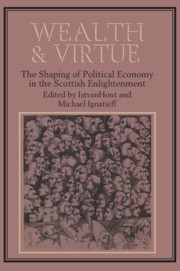Book contents
- Frontmatter
- Contents
- Preface
- List of abbreviations
- 1 Needs and justice in the Wealth of Nations: an introductory essay
- 2 Where had the Scottish economy got to by the third quarter of the eighteenth century?
- 3 Gershom Carmichael and the natural jurisprudence tradition in eighteenth-century Scotland
- 4 The Scottish professoriate and the polite academy, 1720–46
- 5 From applied theology to social analysis: the break between John Locke and the Scottish Enlightenment
- 6 The Scottish Enlightenment at the limits of the civic tradition
- 7 Adam Smith as civic moralist
- 8 The legal needs of a commercial society: the jurisprudence of Lord Kames
- 9 Cambridge paradigms and Scotch philosophers: a study of the relations between the civic humanist and the civil jurisprudential interpretation of eighteenth-century social thought
- 10 Adam Smith's ‘enduring particular result’: a political and cosmopolitan perspective
- 11 The ‘rich country–poor country’ debate in Scottish classical political economy
- 12 John Millar and individualism
- 13 Scottish echoes in eighteenth-century Italy
- Index
12 - John Millar and individualism
Published online by Cambridge University Press: 05 June 2012
- Frontmatter
- Contents
- Preface
- List of abbreviations
- 1 Needs and justice in the Wealth of Nations: an introductory essay
- 2 Where had the Scottish economy got to by the third quarter of the eighteenth century?
- 3 Gershom Carmichael and the natural jurisprudence tradition in eighteenth-century Scotland
- 4 The Scottish professoriate and the polite academy, 1720–46
- 5 From applied theology to social analysis: the break between John Locke and the Scottish Enlightenment
- 6 The Scottish Enlightenment at the limits of the civic tradition
- 7 Adam Smith as civic moralist
- 8 The legal needs of a commercial society: the jurisprudence of Lord Kames
- 9 Cambridge paradigms and Scotch philosophers: a study of the relations between the civic humanist and the civil jurisprudential interpretation of eighteenth-century social thought
- 10 Adam Smith's ‘enduring particular result’: a political and cosmopolitan perspective
- 11 The ‘rich country–poor country’ debate in Scottish classical political economy
- 12 John Millar and individualism
- 13 Scottish echoes in eighteenth-century Italy
- Index
Summary
Since his death in 1801, Millar has lived on in fitful and contradictory reincarnations. Sombart, Pascal and Meek have laid claim to him as the pioneer of the materialist interpretation of history, while Lehmann and Schneider have revived him as the father of mainstream sociology. Millar's politics are no less divergently interpreted. To Duncan Forbes, he is a Smithian ‘scientific’ Whig, while to Hans Medick he is the social scientist of the radical petty bourgeoisie in the transient heyday of petty commodity production. To John Pocock, on the other hand, he is a latter-day civic republican and Commonwealthman, his categories imbedded in the language of corruption and virtue. There is equal disagreement about his legacy. For A. L. Macfie and for Duncan Forbes, Millar is the ‘bridge’ between Smith and the Utilitarians, while others such as Donald Winch and John Burrow have wondered aloud whether Scottish conjectural history and science of government, as Millar practised them, find any echo at all in the Edinburgh Review or the Utilitarians. Does Millar transmit a tradition, or does he announce its end?
Any new look at Millar has to begin with these interpretations and their contradictions.
The emphasis placed by Sombart, Pascal and Meek on Millar and Smith's ‘materialism’ does capture the radicalism of their challenge to a historiography of kings and queens and to an ethical rationalism which looked down upon ‘hunger, thirst and the passion for sex’ as aspects of human nature unfit to be placed at the centre of historical process.
- Type
- Chapter
- Information
- Wealth and VirtueThe Shaping of Political Economy in the Scottish Enlightenment, pp. 317 - 344Publisher: Cambridge University PressPrint publication year: 1983
- 8
- Cited by

